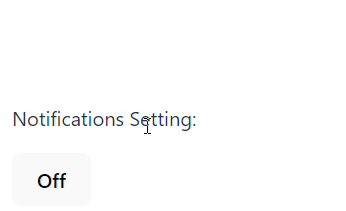RxJS 是一個功能強大的函式庫,但眾所周知,它的學習曲線很陡峭。
這個函式庫龐大的 API 介面,再加上向反應式程式設計的典範轉移,可能會讓新手不知所措。
我創建了 Reactables API 來簡化 RxJS 的使用並簡化開發人員對反應式程式設計的介紹。
我們將建立一個簡單的控制項來切換使用者的通知設定。
它也會將更新的切換設定傳送到模擬後端,然後向使用者顯示成功訊息。

npm i rxjs @reactables/core
import { RxBuilder, Reactable } from '@reactables/core';
export type ToggleState = {
notificationsOn: boolean;
};
export type ToggleActions = {
toggle: (payload: boolean) => void;
};
export const RxNotificationsToggle = (
initialState = {
notificationsOn: false,
} as ToggleState
): Reactable<ToggleState, ToggleActions> =>
RxBuilder({
initialState,
reducers: {
toggle: (state) => ({
notificationsOn: !state.notificationsOn,
}),
},
});
const [state$, actions] = RxToggleNotifications();
state$.subscribe((state) => {
console.log(state.notificationsOn);
});
actions.toggle();
/*
OUTPUT
false
true
*/
RxBuilder 建立一個 Reactable,它是一個包含兩個項目的元組。
UI 可以訂閱狀態變更的 RxJS Observable。
UI 可以呼叫以呼叫狀態變更的操作方法的物件。
使用 Reactable 時不需要主題。
我們可以用純reducer函數來描述我們想要的行為。
Reactables 在幕後使用主題和各種運算符來管理開發人員狀態。
Reactables 處理非同步操作,其效果表示為 RxJS 運算子函數。它們可以用觸發效果的操作/減速器來聲明。
這使我們能夠充分利用 RxJS 來處理非同步邏輯。
讓我們修改上面的切換範例以合併一些異步行為。為了保持簡短,我們將放棄錯誤處理。
import { RxBuilder, Reactable } from '@reactables/core';
import { of, concat } from 'rxjs';
import { debounceTime, switchMap, mergeMap, delay } from 'rxjs/operators';
export type ToggleState = {
notificationsOn: boolean;
showSuccessMessage: boolean;
};
export type ToggleActions = {
toggle: (payload: boolean) => void;
};
export const RxNotificationsToggle = (
initialState = {
notificationsOn: false,
showSuccessMessage: false,
}
): Reactable<ToggleState, ToggleActions> =>
RxBuilder({
initialState,
reducers: {
toggle: {
reducer: (_, action) => ({
notificationsOn: action.payload as boolean,
showSuccessMessage: false,
}),
effects: [
(toggleActions$) =>
toggleActions$.pipe(
debounceTime(500),
// switchMap to unsubscribe from previous API calls if a new toggle occurs
switchMap(({ payload: notificationsOn }) =>
of(notificationsOn)
.pipe(delay(500)) // Mock API call
.pipe(
mergeMap(() =>
concat(
// Flashing the success message for 2 seconds
of({ type: 'updateSuccess' }),
of({ type: 'hideSuccessMessage' }).pipe(delay(2000))
)
)
)
)
),
],
},
updateSuccess: (state) => ({
...state,
showSuccessMessage: true,
}),
hideSuccessMessage: (state) => ({
...state,
showSuccessMessage: false,
}),
},
});
在 StackBlitz 上查看完整範例:
反應 |有角度
讓我們將 Reactable 綁定到視圖。以下是使用 @reactables/react 套件中的 useReactable 鉤子綁定到 React 元件的範例。
import { RxNotificationsToggle } from './RxNotificationsToggle';
import { useReactable } from '@reactables/react';
function App() {
const [state, actions] = useReactable(RxNotificationsToggle);
if (!state) return;
const { notificationsOn, showSuccessMessage } = state;
const { toggle } = actions;
return (
<div className="notification-settings">
{showSuccessMessage && (
<div className="success-message">
Success! Notifications are {notificationsOn ? 'on' : 'off'}.
</div>
)}
<p>Notifications Setting:</p>
<button onClick={() => toggle(!notificationsOn)}>
{notificationsOn ? 'On' : 'Off'}
</button>
</div>
);
}
export default App;
就是這樣!
Reactables 讓我們可以使用純減速器函數建立功能,而不是深入主題世界,從而幫助簡化 RxJS。
然後,RxJS 被保留用於它最擅長的地方 - 組成我們的非同步邏輯。
Reactables 可以擴充並做更多事情!查看文件以了解更多範例,包括如何使用它們管理表單!
以上是使用 Reactables 簡化 RxJS的詳細內容。更多資訊請關注PHP中文網其他相關文章!




